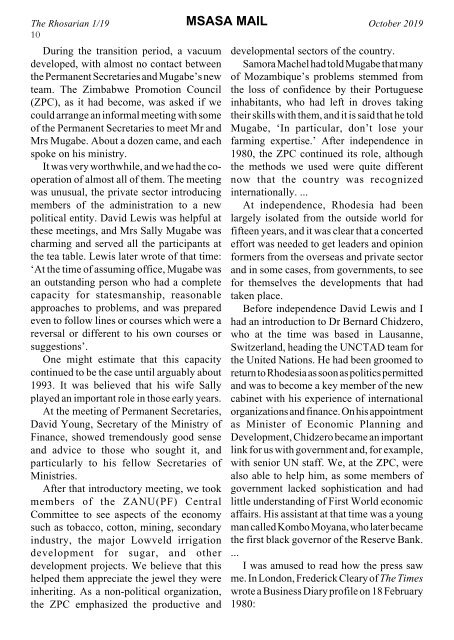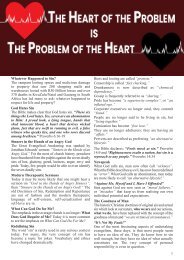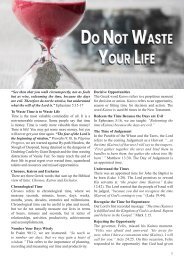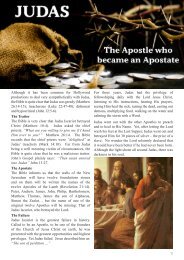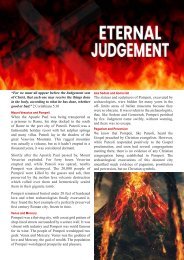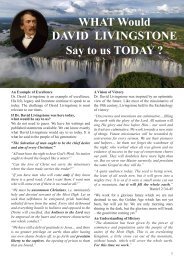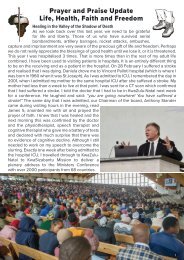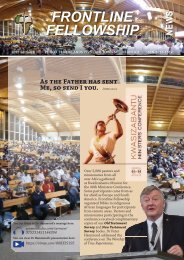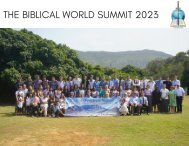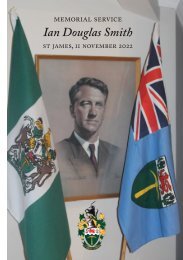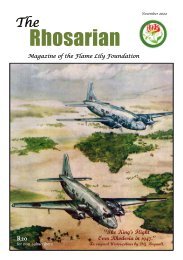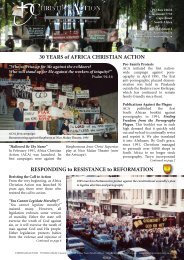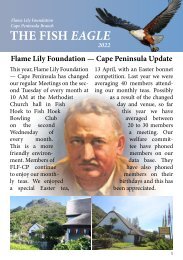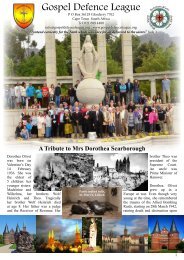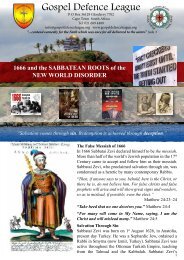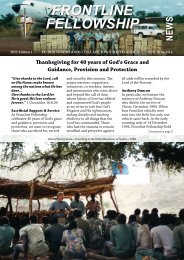Rhosarian 2019
Create successful ePaper yourself
Turn your PDF publications into a flip-book with our unique Google optimized e-Paper software.
The <strong>Rhosarian</strong> 1/19<br />
10<br />
During the transition period, a vacuum<br />
developed, with almost no contact between<br />
the Permanent Secretaries and Mugabe’s new<br />
team. The Zimbabwe Promotion Council<br />
(ZPC), as it had become, was asked if we<br />
could arrange an informal meeting with some<br />
of the Permanent Secretaries to meet Mr and<br />
Mrs Mugabe. About a dozen came, and each<br />
spoke on his ministry.<br />
It was very worthwhile, and we had the cooperation<br />
of almost all of them. The meeting<br />
was unusual, the private sector introducing<br />
members of the administration to a new<br />
political entity. David Lewis was helpful at<br />
these meetings, and Mrs Sally Mugabe was<br />
charming and served all the participants at<br />
the tea table. Lewis later wrote of that time:<br />
‘At the time of assuming office, Mugabe was<br />
an outstanding person who had a complete<br />
capacity for statesmanship, reasonable<br />
approaches to problems, and was prepared<br />
even to follow lines or courses which were a<br />
reversal or different to his own courses or<br />
suggestions’.<br />
One might estimate that this capacity<br />
continued to be the case until arguably about<br />
1993. It was believed that his wife Sally<br />
played an important role in those early years.<br />
At the meeting of Permanent Secretaries,<br />
David Young, Secretary of the Ministry of<br />
Finance, showed tremendously good sense<br />
and advice to those who sought it, and<br />
particularly to his fellow Secretaries of<br />
Ministries.<br />
After that introductory meeting, we took<br />
members of the ZANU(PF) Central<br />
Committee to see aspects of the economy<br />
such as tobacco, cotton, mining, secondary<br />
industry, the major Lowveld irrigation<br />
development for sugar, and other<br />
development projects. We believe that this<br />
helped them appreciate the jewel they were<br />
inheriting. As a non-political organization,<br />
the ZPC emphasized the productive and<br />
MSASA MAIL<br />
October <strong>2019</strong><br />
developmental sectors of the country.<br />
Samora Machel had told Mugabe that many<br />
of Mozambique’s problems stemmed from<br />
the loss of confidence by their Portuguese<br />
inhabitants, who had left in droves taking<br />
their skills with them, and it is said that he told<br />
Mugabe, ‘In particular, don’t lose your<br />
farming expertise.’ After independence in<br />
1980, the ZPC continued its role, although<br />
the methods we used were quite different<br />
now that the country was recognized<br />
internationally. ...<br />
At independence, Rhodesia had been<br />
largely isolated from the outside world for<br />
fifteen years, and it was clear that a concerted<br />
effort was needed to get leaders and opinion<br />
formers from the overseas and private sector<br />
and in some cases, from governments, to see<br />
for themselves the developments that had<br />
taken place.<br />
Before independence David Lewis and I<br />
had an introduction to Dr Bernard Chidzero,<br />
who at the time was based in Lausanne,<br />
Switzerland, heading the UNCTAD team for<br />
the United Nations. He had been groomed to<br />
return to Rhodesia as soon as politics permitted<br />
and was to become a key member of the new<br />
cabinet with his experience of international<br />
organizations and finance. On his appointment<br />
as Minister of Economic Planning and<br />
Development, Chidzero became an important<br />
link for us with government and, for example,<br />
with senior UN staff. We, at the ZPC, were<br />
also able to help him, as some members of<br />
government lacked sophistication and had<br />
little understanding of First World economic<br />
affairs. His assistant at that time was a young<br />
man called Kombo Moyana, who later became<br />
the first black governor of the Reserve Bank.<br />
...<br />
I was amused to read how the press saw<br />
me. In London, Frederick Cleary of The Times<br />
wrote a Business Diary profile on 18 February<br />
1980:


